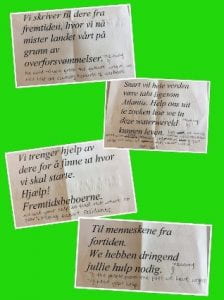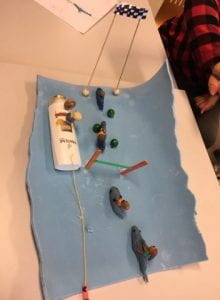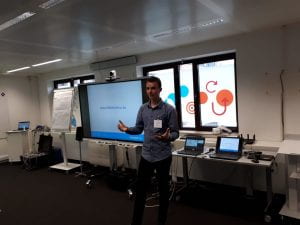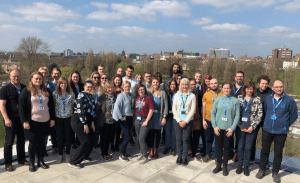What happens if the sea level rises?
Seminarieskolen, Denmark, Dlab year 3.
To begin the process, the students received a letter addressed to the whole class.
Desperate for help, people from the future had sent a letter back in time to them. The world was flooded, and they had nowhere to live, so it was up to the students to find housing solutions for them that they could use in the future.
Over the years, the European borders had blurred and new languages had been created, so the letter needed deciphering.
Til menneskene fra fortiden.
We hebben dringend jullie hulp nodig.
Vi skriver til dere fra fremtiden, hvor vi nå mister landet vårt på grunn av overforsvømmelser.
The sea levels are rising rapidly, and with every day that goes by, more and more of it goes underwater.
Snart vil hele verden være tabt ligesom Atlantis. Help ons uit te zoeken hoe we in deze waterwereld kunnen leven.
Vi trenger hjelp av dere for å finne ut hvor vi skal starte.
What would you do if you were in our place?
Hjælp!
Fremtidsbeboerne.
Once the code was cracked, the students had a brief understanding on the theme of the day.
“How would we live if the sea level rises?”
Development stage
After the brain storm, the students started sketching houses that could be built on or under water. The students collected resources and began building their houses.
While building, the students tested their houses in a water tank.
During the whole process, the teachers tweeted, so the students could see what the students in the other countries were doing.
We wanted the students to be innovative, but realistic. So we had to consider giving the students limited resources, or working with more unlimited resources.
Deliverance stage
Green screening.
When the houses were finished, the students took photos of their houses on a green background and uploaded them to a Padlet.
As a background, they chose a video of the sea and then exported the videos to IMovie and included explanations and text.
The final results were videos showing how houses from different countries could be combined in a future world that is flooded.
The students then received another letter from the future, thanking them as they had survived the flooding thanks to the housing designs the students had produced. But the people from the future now had other problems as to their everyday lives. They now needed ideas for clothing, food, entertainment, travel and water in conjunction with their new life on water.
So the students had the task of designing and producing products to help with these problems.











